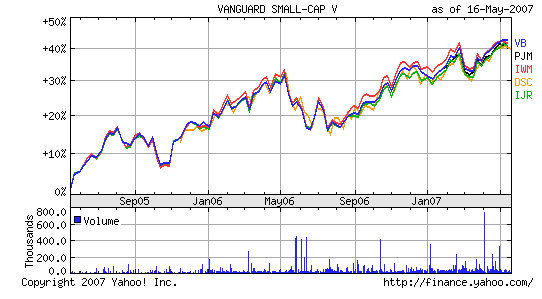Mutual Funds V Small Cap Stocks
Post on: 7 Июль, 2015 No Comment

John C. Bogle, the founder of investment management firm Vanguard, has estimated that the investment industry collectively shaves around 3% from stock returns each year. This stems primarily from the fees it charges for managing assets for individuals and institutions. Bogle has also openly questioned the value of actively managed funds over index funds. Exchange traded funds (ETFs) are another low-cost way to invest primarily in passive, indexed strategies. Not surprisingly, Vanguard was founded on low-cost index funds and has moved into ETFs, as have most other well-known firms in the industry.
Mutual Funds
The industry also likes to divide up stocks by market capitalization. Generally, active managers of large capitalization stocks have the worst track records when compared to their underlying index. An industry report from late 2011 estimated that two-thirds of large-cap mutual funds underperformed their index over the past three years. The best category was in the small-cap space, but 63% of active managers still underperformed. The only space where managers steadily beat their bogey was in the small cap international space of the market. The small-cap value category was also a relatively strong category.
Based on the above data, for the most part, investors would be well served to invest in index funds that simply look to match market returns. Standard small-cap indexes include the Russell 2000 and S&P Small Cap 600. These can be further divided into growth and value components. Internationally, the MSCI EAFE Index also offers a small-cap option.
Actively managed funds seek to outperform the above small-cap indexes, but have a mixed track record of doing so. High expense ratios are partially to blame, and small-cap funds generally carry higher expense ratios than other market-cap weighted options. A sampling of funds tracked by mutual fund rating firm Morningstar, consistently showed expense ratios above 1%, with a large number charging rates above 1.50% and as high as 1.65%, which it characterized as a high overall level.
Exchange-Traded Funds
Small-cap ETFs generally charge much lower fees than actively managed alternatives. The expense ratio for the iShares Russell 2000 Index Fund was recently listed at 0.26%, while the iShares S&P SmallCap 600 Index Fund was even lower at 0.20%. The small-cap ETF category still charges higher fees than the other market-cap options. For example, the iShares S&P 500 Index Fund charges only 0.09%. However, the fees are still much lower than for actively managed small-cap mutual funds.
Vanguard offers a small-cap ETF that charges a fee of only 0.16%, which it states is lower than 88% of similar funds out there. Its passive, small-cap index mutual funds also charge reasonable expense ratios between 0.13% and 0.43%. Its small-cap value fund charges only 0.21%. Generally, both passive ETFs and mutual funds make sense in the small-cap space.
At the time of writing, Ryan C. Fuhrmann was long shares of HP but did not own shares in any of the other companies mentioned in this article.














